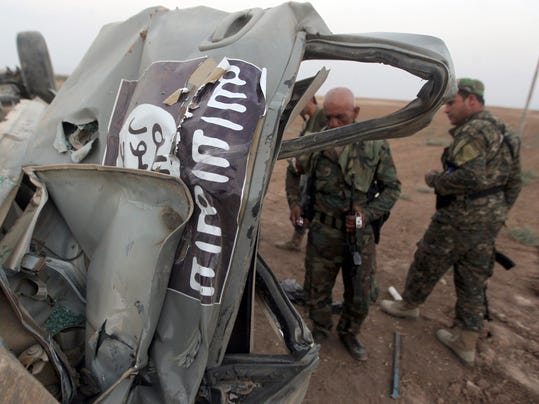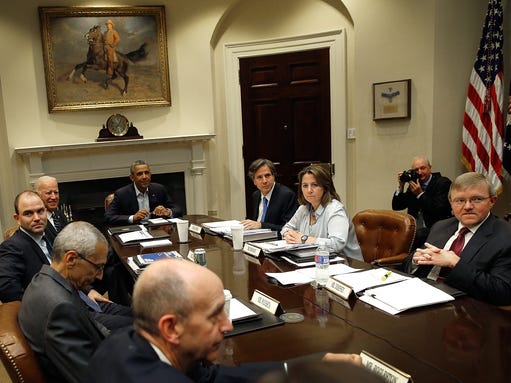
(Photo: Ahmad Al-Rubaye, AFP/Getty Images)
Americans are increasingly inclined to say the United States has a responsibility to respond to rising violence in Iraq, a USA TODAY/Pew Research Center Poll finds, although most also express fears about getting pulled back into a extended conflict there.
In a shift of opinion in recent weeks, those surveyed by 44%-41% say the U.S. bears a responsibility to "do something" about the violence. That's a shift from last month, when by 55%-39% a majority saw no U.S. responsibility to act.
That change could reflect news coverage of the plight of thousands of Yazidi refugees who fled advancing Islamic State forces only to become trapped on Mount Sinjar, at risk of dying from exposure, hunger and thirst. On Thursday from Martha's Vineyard, President Obama announced that U.S. airstrikes and humanitarian aid had succeeded in easing that crisis.
"It's interesting that this long after we've been involved in a country like Iraq that is so controversial, we still find people changing their minds," says Christopher Gelpi, a political scientist at Ohio State University who studies public opinion toward military conflicts. The percentage of Republicans, conservatives, and people 50 and older who see a responsibility rose by double digits compared with the July survey.
Even Americans who see a responsibility to act are worried about an expanding commitment less than three years after the United States withdrew combat troops. Fifty-one percent are more concerned that the U.S. will go too far in getting involved. About a third, 32%, say their greater concern is that the U.S. will not go far enough in stopping the Islamist militants.
Views differ sharply across age groups.
Those under 30 are less likely to approve of airstrikes than older Americans are, and they are much more likely to express concern about the risks of an expanding U.S. engagement in Iraq. By more than 3-1, 18-to-29-year-olds worry more that the U.S. will get too involved. Those 65 and older are about evenly divided between concerns over whether the U.S. will go too far or not do enough to stop the militants.
The telephone survey of 1,000 adults, taken Thursday through Sunday, has a margin of error of +/-4 percentage points.
Obama returned to the White House from his vacation early Monday morning to meet with Vice President Biden and top national security advisers about Iraq. The United States has widened airstrikes to help Kurdish fighters trying to retake the Mosul Dam from the Islamic State forces. On Monday, U.S. fighters, bombers and drones conducted 15 airstrikes, the U.S. Central Command said.

President Obama meets with members of the National Security Council for an update on Iraq in the Roosevelt Room of the White House on Aug. 18.(Photo: Win McNamee, Getty Images)
Since Aug. 8, the U.S. has conducted 68 airstrikes in Iraq.
Most Americans, 54%-31%, approve of the airstrikes. That is a bit lower than public support for NATO airstrikes in Kosovo in 1999 and U.S. airstrikes against Iraq and Afghanistan in 1998 and 1999.
"The public attitude seems to reflect very much the kind of attitude that you heard from Obama when he was justifying the airstrikes," Gelpi says. "The president was very much in sync in feeling we ought to try to do something but we shouldn't do too much. Whether the president is leading the public, or whether the president has his finger in the wind and understands where the public is at, is hard to say."
Fifty-two percent say they are following news stories about the airstrikes "very closely" or "fairly closely." While that's higher than the 49% paying attention to the continuing friction between Russia and Ukraine, it's lower than the 57% paying close attention to the aftermath of the police shooting in Ferguson, Mo., and the 58% tracking the Ebola virus breakout in West Africa.
Of the most interest: the death of actor Robin Williams, followed closely by 62%.
Follow @susanpage on Twitter

No comments:
Post a Comment